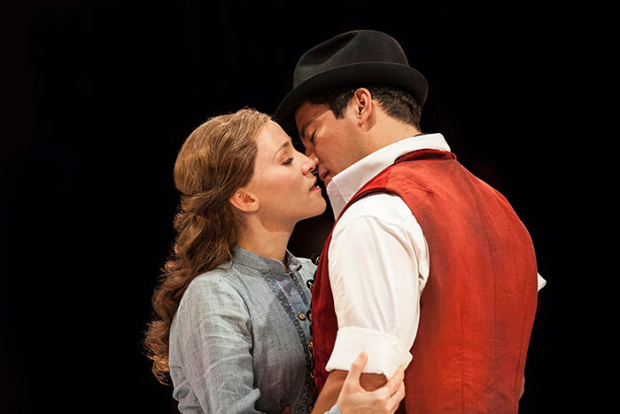Carousel

(© Maria Baranova)
Arena Stage's artistic director Molly Smith makes no secret about her desire to produce America's "gold standard" musicals. She has directed two of Richard Rodgers and Oscar Hammerstein II's works, South Pacific in 2002 and Oklahoma in 2010. Now Smith directs her third Rodgers and Hammerstein show, Carousel, in a brilliant and vigorous new in-the-round staging, where everything from the score to the choreography has been refreshed.
Carousel takes place in a small town in Maine in 1873. Its main characters are a young mill worker, Julie Jordan, who is in love with a carnival barker, an outsider named Billy Bigelow; Julie's best friend, Carrie; Carrie's fiancé, Enoch Snow; and carousel owner Mrs. Mullin. People from the village make up the ensemble. The plot weaves through the ordinary life of fishermen and their wives, whose hard work is dotted with small celebrations: the arrival of a carnival, a clambake, and a high school graduation.
Smith begins the musical with Julie Jordan, a young mill worker, at work, weaving at a loom, bored by its mechanical motion, waiting for the whistle to let her escape from the mill. That change sets up the central theme of the show: Julie's desire for true love and her belief that she has found it when she meets and falls in love with Billy.
He turns out to be a changeable creature, however, one capable of physical violence against his wife, born of his frustration at having been fired from the carnival when he ran away to be with Julie. His punishment is to be spurned by society. Once he learns that Julie is pregnant, Billy allows himself to be talked into a violent scheme to make money. When the plot fails, Billy takes his own life rather than be captured by the police.
There is a final scene in which Bigelow is in purgatory watching what is happening on earth. He sees his teenage daughter, Louise, and goes down to talk to her, bringing her a star from heaven and begging for more time to see her graduate from high school. It is this extra time that allows Billy to atone for his abusive nature and redeem himself.
Nicholas Rodriguez turns in an impressive, muscular performance as Billy Bigelow, an impulsive young man who is as charming as he is physically strong. He displays incredible range with his impressive tenor voice and occasionally includes a slight, warm vibrato when he wants to intensify a note. Betsy Morgan is excellent as Julie, self-assured, determined, and unafraid of her own desire for an obvious bad boy. Her sweet yet powerful soprano is particularly effective in "If I Loved You" and "What's the Use of Wond'rin."
Kate Rockwell is sensational as the sweet-hearted Carrie, and Kurt Boehm is equally fine as the tongue-tied Mr. Snow. Kyle Schliefer handily turns Bigelow's friend Jigger into a ne'er-do-well Irishman, to extend the notion of the outsider. E. Faye Butler is pitch-perfect as Mrs. Mullin, who swaggers around the mill town and tries to scare Julie away from Bigelow. Ann Arvia is well cast as Nettie Fowler, and Rayanne Gonzales is delightful as Mrs. Bascombe.
The orchestra in this production is smaller than the original, but just as mighty. Twelve instruments take the place of the first Broadway production's 30. Musical director Paul Sportelli rearranged the score for this chamber production and divided the orchestra. His strings and horns sit on a platform above the stage, and the rhythm section sits below it.
Set designer Todd Rosenthal utilizes that platform, giving it white, wooden uprights and a roof to make it look like a country pergola. The circular stage below is made of off-white wood with a central turntable, which is used for various recurring references to a carousel. The only props are clam crates.
Costume designer Ilona Somogyi gives the women simple, floor-length dresses. The fishermen wear boots and waterproof hats. As a barker, Bigelow is dressed in a red velvet vest and black cap. In addition to the original dances by Agnes De Mille, choreographer Parker Esse adds stunning new interpretive dances. David Leong's mime direction adds yet another layer of depth.
The final scene of Carousel is sometimes played with a dreamy, gauzy unreality. Because Smith has opted instead to play this last scene with all the complexity Bigelow has shown throughout his life, the musical ends on a note of hope, admitting that reality is messy and gritty, while also suggesting that there may be a possibility for grace and redemption after all.











